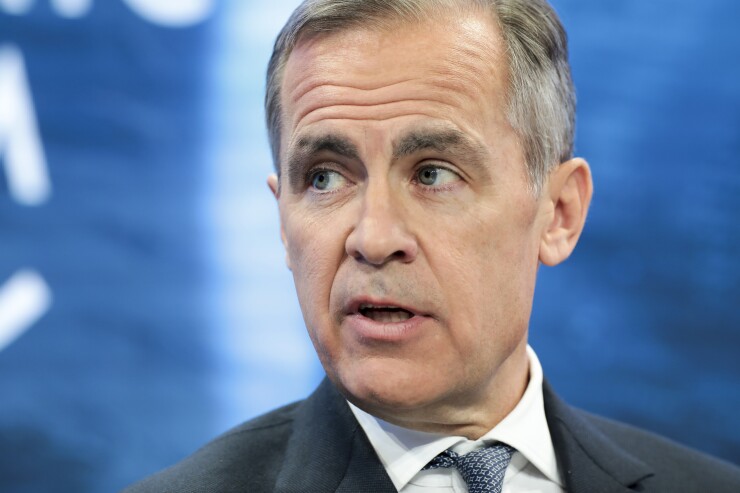Mark Carney, one of the leading global voices on the risks that climate change poses to the financial system, said transitioning to a low-carbon economy should not be an all-or-nothing proposition.
In a talk Monday hosted by the Brookings Institution, the former Bank of England governor discussed the role that financial institutions can play in fostering the transition, and outlined a strategy for balancing short- and long-term initiatives.
“What we want to avoid is a very binary approach, in which there are green assets and brown assets, and we get rid of all the brown and go to the green,” Carney said. “That’s not a transition. … That won’t get us to where we need to go.”

Carney, who is currently the United Nations’ special envoy on climate action and finance,
In 2015, as chairman of the Financial Stability Board, he established the Task Force for Climate-related Financial Disclosures, which encourages companies to disclose their climate-related risks. As governor of the Bank of England from 2013 to 2020, he led early efforts to incorporate climate risk into stress testing.
In the United States, the role that financial regulators should play in combating climate change has become politically charged. As the Federal Reserve has begun to assess climate risk in the financial system, it has
At the same time, banks
Carney, who was promoting a
Indeed, many bankers have started thinking more seriously about the
“What does that really mean? That means there’s an opportunity to finance a series of activity changes over the next 10, 20, 30 years to allow them to get to net-zero,” Moynihan said at the Bernstein Strategic Decisions Conference. “There's a huge business opportunity because it's being driven by consumer and corporate demand.”
Seventy percent of finance officers at companies with at least $1 billion of revenue reported in a recent U.S. Bancorp survey that their focus on environmental, social and governance issues had increased over the past 12 months.
“I don’t think it’s a coincidence that some of the largest companies in sectors and industries facing some of the largest challenges when it comes to sustainability are paying the most attention to it,” said Marcus Martin, head of ESG for U.S. Bancorp’s fixed income and capital markets business.
Carney focused his remarks Monday on steps that policymakers can take in the short term to produce fast results in the fight against climate change. Such efforts can help generate and sustain momentum, he said.
“It does put a premium on measures that have an immediate payback on jobs and economic growth,” Carney said.
Retrofitting homes to make them more energy efficient might be one example. “You do those things early that have tangible benefits, affect a lot of people, create a lot of jobs, and you say this is what it’s about, as opposed to everybody having to eat lentils.”
But Carney also argued that policymakers need to push for tougher regulation that will also spur further investment in infrastructure upgrades and renewable energy. He gave the example of the U.K.’s plan to
Transitioning to a low-carbon economy is also a matter of global competitiveness, Carney said, noting that that “has not been lost on other major economic powers.”
“We’ve left this issue very late, so the scale of what needs to be done is enormous,” he said. “That’s true for virtually every country.”





